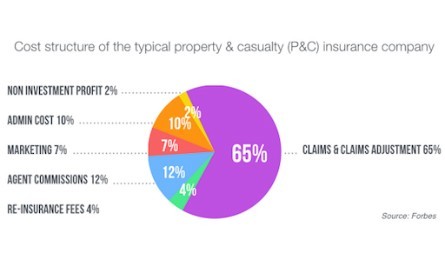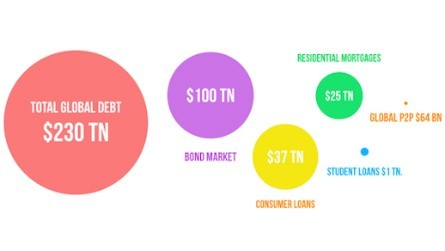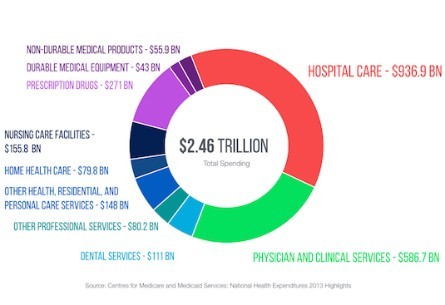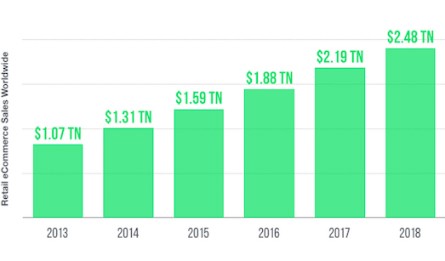Fresh fields: Five trillion-dollar markets ripe for startup innovation – StartupSmart

A big market with lots of potential customers is one of the most critical factors in a startup’s success. The bigger the market, the more problems it has to be solved and thus the more opportunities it presents for entrepreneurs. If you’re looking for a startup idea, here are some huge markets to look into.
1. Insurance
Global insurance premium volume has reached $4.8 trillion in 2014, a 3.7% increase over 2013, according to a Swiss Re Ltd. US insurance companies account for $1.3 trillion, the biggest revenue chunk in the world.
But somehow, this incredibly huge market has remained largely untouched by technological innovation. In the 21st century, consumers are still dialling numbers to phone up their local agent for a new policy.

At the same time, insurance companies consistently score the worst net promoter score (NPS) among all industries. They simply don’t inspire satisfaction or loyalty in their customers. Thus, thanks to its backwardness, insurance is the next opportunity for a mobile and technological disruption.
2. Debt & lending
The total size of the global debt pool in 2013 stood at $230 trillion. A big part of that debt is owned by governments while over 90% of it is originated by central, commercial and retail banks. The non-banking sector “only” represents about $15 trillion of that figure.

This is a huge market. There’s government debt, corporate debt, bonds, mortgages, leasing, consumer loans, etc. Student loans alone make up to $1 trillion. The entire consumer loans market is ridden with problems such as lack of access, complex system, lack of transparency, and slow application processes.
Not surprisingly, peer-to-peer (P2P) lending startups have taken advantage of the post-2008 crisis and created the next trillion dollar market. But P2P is only one aspect of the global debt market. There are issues in credit rating, small business loans, student debt, mortgage market and even the $100 trillion bond market.
3. Healthcare
According to a new report from Price Waterhouse Coopers, the global healthcare market for consumers, providers, payers, and investors is worth $9.59 trillion. The report also points out that this enormous marketplace is undergoing a disruption from new entrants from outside the traditional business of healthcare.
It states “these new entrants are pioneering pathways into virtual healthcare, more affordable and convenient care options, wellness and fitness, and more.” Needless to say, these “new entrants” are tech startups and mobile technology companies taking advantage of innovations in the internet, mobile and hardware space.

The potential is limitless. For example, consumer healthcare (vitamins, nutrition, weight management and fortified foods and beverages) is a $502 billion market that is expected to grow by almost 50% from 2013 – 2018, according to Accenture.
The global healthcare analytics market is expected to reach $18.7 billion by 2020; home healthcare market will grow to over $250 billion, and global IT spending is expected to reach $162.2 billion this year. And the list goes on.
4. eCommerce
According to eMarketer, the total sales for retail worldwide are going to reach $24 trillion in 2015, a 6.6% increase over 2014. However, it’s not really a surprise that global retail is gigantic.

But when it comes to eCommerce, the figures are equally exciting. Today, the global eCommerce generates $1.6 trillion in revenues, growing at an incredible 20.9% rate over 2014. That represents over $330 billion growth.
Clearly, eCommerce is disrupting traditional retail, and the opportunity keeps growing. With the proliferation of iPads, wearables and over 2 billion smartphone users, new markets and opportunities such as mobile commerce, location enable payments, subscription commerce, and many more open up.
5. Wealth Management
Investment management is undergoing a radical change. Customers no longer trust traditional investment firms to invest their money, and frankly few of them have time to listen to their sales pitches.
As a result, financial investment apps like Wealthfront and Betterment started to attract interest among many professionals who are too busy to worry about the stock market. These automated advisers currently manage over $14 billion, 83% of that in the US, according to Swiss research firm MyPrivateBanking. But in the next five years, that number is expected to skyrocket to about $255 billion worldwide.
While it sounds like a lot of money, it’s still only a small fraction of the assets managed by the traditional wealth-management firm who control around $17 trillion according to Aite Group. Automated advisers charge much less and provide a better service thanks to big data and other technologies an average adviser doesn’t have.
Want to grow your business with Instagram? StartupSmart School can help.

